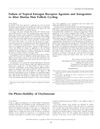Search
for
Sort by
Research
780-810 / 1000+ results
research Finasteride Versus Cyproterone Acetate-Estrogen Regimens in the Treatment of Hirsutism
Finasteride and CPA-EE2 equally reduce hirsutism, but affect hormone levels differently.

research Androgen Receptor in Rat Liver: Characterization and Separation from a Male-Specific Estrogen-Binding Protein
Male rats have androgen receptors in their liver, which are different from proteins that bind estrogen.

research Evaluation of the Relationship Between Serum G Protein-Coupled Estrogen Receptors (GPER-1) Levels and the Severity and Duration of the Disease in Patients with Androgenetic Alopecia: A Case-Control Study
Higher GPER-1 levels are linked to more severe and shorter-duration androgenetic alopecia, suggesting GPER-1 as a potential treatment target.

research Evaluation of Serum G Protein-Coupled Estrogen Receptor 1 (GPER-1) Levels in Patients with Androgenetic Alopecia
Alopecia patients have less GPER-1, which might affect hair loss.
research The Role of Estrogen in Women with Androgenetic Alopecia

research Spironolactone Use Does Not Increase the Risk of Estrogen-Dependent Cancer Recurrence: A Retrospective Analysis
Taking vitamin C and vitamin E twice a day can help prevent sunburn and DNA damage from UVB exposure.
research Hair Regrowth in Endocrine Therapy Alopecia With Dutasteride Treatment in Women With Estrogen Positive Breast Cancer

research The Role of Melatonin in Neuroectodermal-Mesodermal Interactions: The Hair Follicle Synthesizes Melatonin and Expresses Functional Melatonin Receptors
Hair follicles produce and respond to melatonin, affecting hair growth and sensitivity to estrogen.

research Skin Connective Tissue and Aging
Menopause reduces skin collagen and elasticity, and while estrogen therapy can help, its risks require careful consideration.

research Sex Steroid Synthesis in Human Skin In Situ: The Roles of Aromatase and Steroidogenic Acute Regulatory Protein in the Homeostasis of Human Skin
Human skin produces sex hormones like estrogen and testosterone, influenced by ARO and StAR, which may affect skin elasticity and hair growth.

research Estrogens and Human Scalp Hair Growth: More Questions Than Answers
The effects of estrogen on human hair growth are unclear and need more research.

research Gender Differences in Cardiac Hypertrophy
Women generally handle heart enlargement better than men, but it's riskier for them if it occurs; hormones like estrogen offer some protection.
research Circulating Androgen Levels Before and After Oophorectomy in Premenopausal and Postmenopausal Women
Oophorectomy lowers testosterone and estrogen levels in both premenopausal and postmenopausal women, with postmenopausal women still producing significant testosterone.

research Estrogen Receptor Evaluation in Pomeranian Dogs with Hair Cycle Arrest (Alopecia X) on Melatonin Supplementation
Melatonin helped some Pomeranian dogs regrow hair, but it wasn't linked to estrogen receptors.

research 17β-Estradiol Enhances Vascular Endothelial Growth Factor Production and Dihydrotestosterone Antagonizes the Enhancement via the Regulation of Adenylate Cyclase in Differentiated THP-1 Cells
Estrogen increases blood vessel growth factor production, while testosterone blocks this increase.

research Immuno-Endocrinology of COVID-19: The Key Role of Sex Hormones
Sex hormones may affect COVID-19 severity, with estrogen possibly reducing risk and testosterone potentially increasing it.

research Female Pattern Hair Loss: Beyond an Androgenic Aetiology?
Estrogen and prolactin may play bigger roles in female hair loss than previously thought.
research Testosterone Prevents Cutaneous Ischemia and Necrosis in Males Through Complementary Estrogenic and Androgenic Actions
Testosterone helps prevent skin damage in males by acting through both estrogen and androgen pathways.
research Female Pattern Hair Loss May Be Triggered by Low Estrogen to Androgen Ratio
Low estrogen compared to androgen may cause female hair loss.

research An Attempt to Assess the Magnitude of Endogenous Androgen Production in a Case of the Adrenogenital Syndrome
A 17-year-old female with adrenogenital syndrome produces very high levels of androgens, which prevent complete feminization despite high estrogen doses.

research On Photo-Stability of Oxybenzone
Estrogen receptors may not affect mouse hair growth as previously thought, and oxybenzone in sunscreen is stable in sunlight.
research A Long-Term Follow-Up Study of Men Born with Very Low Birth Weight and Their Reproductive Hormone Profile
Men born very underweight had higher estrogen levels but normal reproduction compared to normal birth weight men.
research Melasma in a Transgender Woman
Transgender women on estrogen therapy can develop melasma and need proper skin care.

research Outcome and Clinical-Biological Characteristics of Patients with Advanced Breast Cancer Undergoing Removal of Ovarian/Pelvic Metastases
Patients with advanced breast cancer and high hormone receptor levels who had surgery for ovarian/pelvic metastases lived longer, especially if they had high estrogen receptor levels.

research PSSD, PFS, PRSD: A Perspective for Aetiology and Treatment
The paper suggests that a decrease in estrogen receptor activity may cause sexual dysfunction syndromes and proposes hormonal treatments.

research Worldwide Cancer Incidences Analyzed by Sex, Age, and Skin Type Over Time (1955-2007), Excluding Skin Cancer, Reveals Important Carcinogenic Drivers
Cancer rates are increasing in developed countries, with estrogen, aging, low vitamin D3, and HPV infection as common causes.

research Obstetric and Gynecologic Dermatology
A pregnant woman's skin condition improved after giving birth, possibly due to high estrogen levels during pregnancy.

research Clinical Exome Sequencing Unveils the Genetic Landscape of Polycystic Ovarian Syndrome Focusing on Lean and Obese Phenotypes: Implications for Cost-Effective Diagnosis and Personalized Treatment
Young women in West Bengal, India, with PCOS often have estrogen resistance, leptin receptor issues, folate deficiency, T2DM, and acanthosis, commonly linked to obesity.

research The Hormonal Background of Hair Loss in Non-Scarring Alopecias
Hormones like androgens, estrogen, thyroid hormones, and stress hormones can contribute to hair loss, and treatments target these hormonal imbalances.